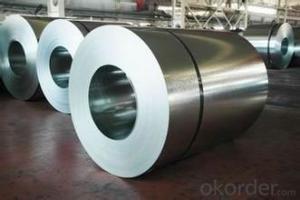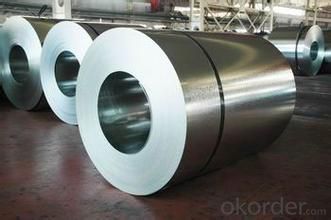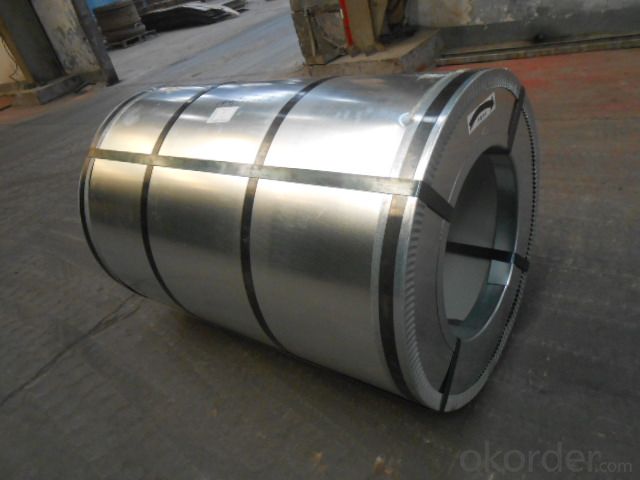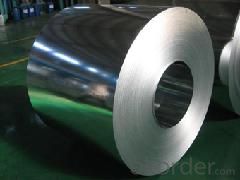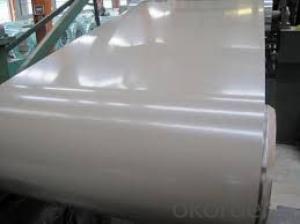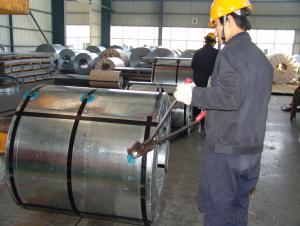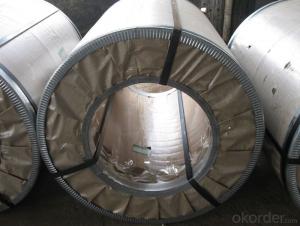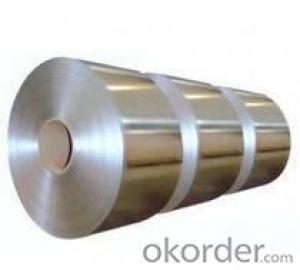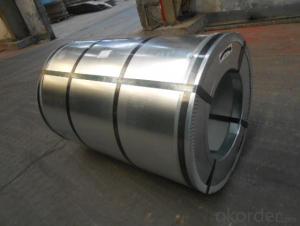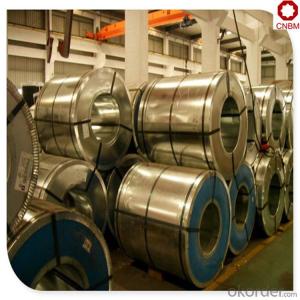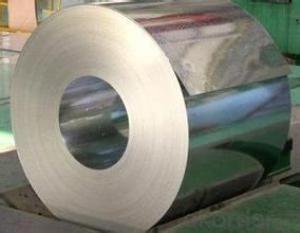Hot-Dip Galvanized Steel Coil with Good Quaity of China
- Loading Port:
- Shanghai
- Payment Terms:
- TT OR LC
- Min Order Qty:
- 50 m.t.
- Supply Capability:
- 10000 m.t./month
OKorder Service Pledge
OKorder Financial Service
You Might Also Like
1. Hot-Dip Galvanized Steel Coil Description:
Hot-dip galvanized steel coil are available with a pure zinc coating through the hot-dip galvanizing process. It offers the economy, strength and formability of steel combined with the corrosion resistance of zinc. The hot-dip process is the process by which steel gets coated in layers of zinc to protect against rust. It is especially useful for countless outdoor and industrial application.
2.Main Features of the Hot-Dip Galvanized Steel Coil:
• Excellent process capability
• Smooth and flat surface
• Workability, durability
• Excellent heat resistance performance
• High strength
• Good formability
• Good visual effect
3.Hot-Dip Galvanized Steel Coil Images
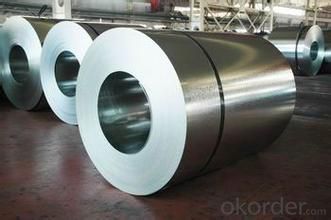
4.Hot-Dip Galvanized Steel Coil Specification
Standard: AISI, ASTM, BS, DIN, GB, JIS
Grade: SPCC, SPCD, Q195, DX51D
Thickness: 0.15-5.0mm
Model Number: coil
Type: Steel Coil
Technique: Cold Rolled
Surface Treatment: Galvanized
Application: Container Plate
Special Use: High-strength Steel Plate
Width: 600-1250mm
Length: depends
commodity: hot dipped galvanized steel coil
technique: cold rolled
thickness: 0.15-5.0mm
width: 600-1500mm
surface treatment: galvanized
zinc coating: 50-275g/m2
coil weight: 3-7 tons
coil ID: 508/610mm
spangle: zero spangle, regular spangle, small spangle, big spangle
payment term: by L/C or T/T
5.FAQ of Hot-Dip Galvanized Steel Coil
What’s the application of this product?
There are many applications for this product. For example, roofing, cladding, decking, tiles, sandwich walls, etc.
What’s the coating composition of Hot-Dip Galvanized Steel Coil?
The coating composition is 55% aluminium in weight ratio, 43.4% zinc, and 1.5% silicon, with excellent corrosion and heat resistance performance.
- Q: I just got this aftermarket exhaust on my truck and it's recommended that it be welded, but the metal is aluminized steel. How do I mig weld aluminized steel?
- This Site Might Help You. RE: How to weld aluminized steel? I just got this aftermarket exhaust on my truck and it's recommended that it be welded, but the metal is aluminized steel. How do I mig weld aluminized steel?
- Q: What is the weight of a standard steel coil?
- The weight of a standard steel coil can vary, but on average, it ranges from 10 to 20 tons.
- Q: What are the different types of steel coil surface treatments for corrosion resistance?
- There are several different types of steel coil surface treatments that are used to enhance corrosion resistance. These treatments are applied to the surface of the steel coil to create a protective layer that prevents corrosion and extends the lifespan of the steel. Some of the common types of surface treatments for corrosion resistance include: 1. Galvanizing: This is one of the most popular and effective methods for protecting steel against corrosion. In this process, a layer of zinc is applied to the surface of the steel coil. The zinc acts as a sacrificial anode, corroding before the steel does, thus protecting it from rust and corrosion. 2. Chromate conversion coating: This treatment involves applying a chromate-based solution to the surface of the steel coil. The chromate forms a thin film on the steel, providing a protective barrier against corrosion. It also enhances the adhesion of paint or other coatings that may be applied later. 3. Phosphating: Phosphating is a process where a phosphate coating is applied to the steel coil. This coating provides excellent corrosion resistance by forming a chemical bond with the steel surface. It also improves the adhesion of subsequent coatings or paints. 4. Organic coatings: These coatings, such as paint or epoxy, are applied to the steel coil to create a barrier between the steel and the surrounding environment. They provide both corrosion resistance and aesthetic appeal. The choice of organic coating depends on the specific application and the desired level of corrosion protection. 5. Zinc-rich paint: Similar to galvanizing, zinc-rich paint contains a high concentration of zinc particles. When applied to the steel coil, the zinc particles provide sacrificial protection, preventing corrosion. This coating is often used in harsh environments or for steel coils that will be exposed to frequent moisture or saltwater. It is important to note that the choice of surface treatment depends on various factors such as the application, environment, budget, and required level of corrosion resistance. Consulting with a steel coil manufacturer or corrosion specialist is recommended to determine the most suitable treatment for a specific situation.
- Q: How are steel coils tested for flatness and straightness?
- Steel coils are tested for flatness and straightness using a variety of methods. One common method is to pass the coil through a series of rollers that apply pressure and measure any deviations in the surface. Another method involves using laser sensors to scan the entire coil and detect any irregularities. Additionally, visual inspections are conducted to identify any visible imperfections or distortions.
- Q: I am trying to make a homemade fender eliminator for my motorcycle and the instructions from the site I found said to use 22 gage weld steel. I went to lowes and all they had was 26 gage sheet metal. What is the difference between the two? Is weld steel less flexible?
- Most sheet metal is coated with galvanizing. Not fun to weld on. Most steel for welding use is just carbon steel.
- Q: How are steel coils used in the manufacturing of drivetrains?
- Steel coils are commonly used in the manufacturing of drivetrains as they provide the necessary strength and durability required for these critical components. The steel coils are typically formed into various shapes, such as gears, shafts, and axles, which are then machined and assembled to create the drivetrain system. These steel components help transfer power from the engine to the wheels, allowing the vehicle to move efficiently and smoothly.
- Q: How are steel coils used in the production of HVAC equipment?
- Steel coils are used in the production of HVAC equipment as they serve as the primary components for heat transfer. These coils are responsible for facilitating the transfer of heat between the air and refrigerant, ensuring efficient cooling or heating of the air circulating within the HVAC system.
- Q: What are the factors affecting the formability of steel coils?
- There are several factors that can affect the formability of steel coils. Some of the key factors include the composition of the steel, its mechanical properties, the thickness and width of the coils, the temperature at which the forming process takes place, the type and amount of lubrication used, and the speed and pressure applied during forming. Additionally, the presence of defects or impurities in the steel can also impact its formability.
- Q: What are the different steel coil packaging methods?
- Some of the different steel coil packaging methods include wrapping the coil with plastic or paper, using steel strapping or banding to secure the coil, placing it in a wooden crate or box, or using steel or plastic sleeves to protect the edges of the coil.
- Q: How are steel coils used in the manufacturing of automotive fuel tanks?
- Steel coils are used in the manufacturing of automotive fuel tanks as they provide strength and durability to the tanks. These coils are formed into the desired shape and welded together to create a sturdy container that can withstand the pressure and impact of the fuel. Additionally, steel coils can be coated to prevent corrosion and ensure the longevity of the fuel tank.
Send your message to us
Hot-Dip Galvanized Steel Coil with Good Quaity of China
- Loading Port:
- Shanghai
- Payment Terms:
- TT OR LC
- Min Order Qty:
- 50 m.t.
- Supply Capability:
- 10000 m.t./month
OKorder Service Pledge
OKorder Financial Service
Similar products
Hot products
Hot Searches
Related keywords
